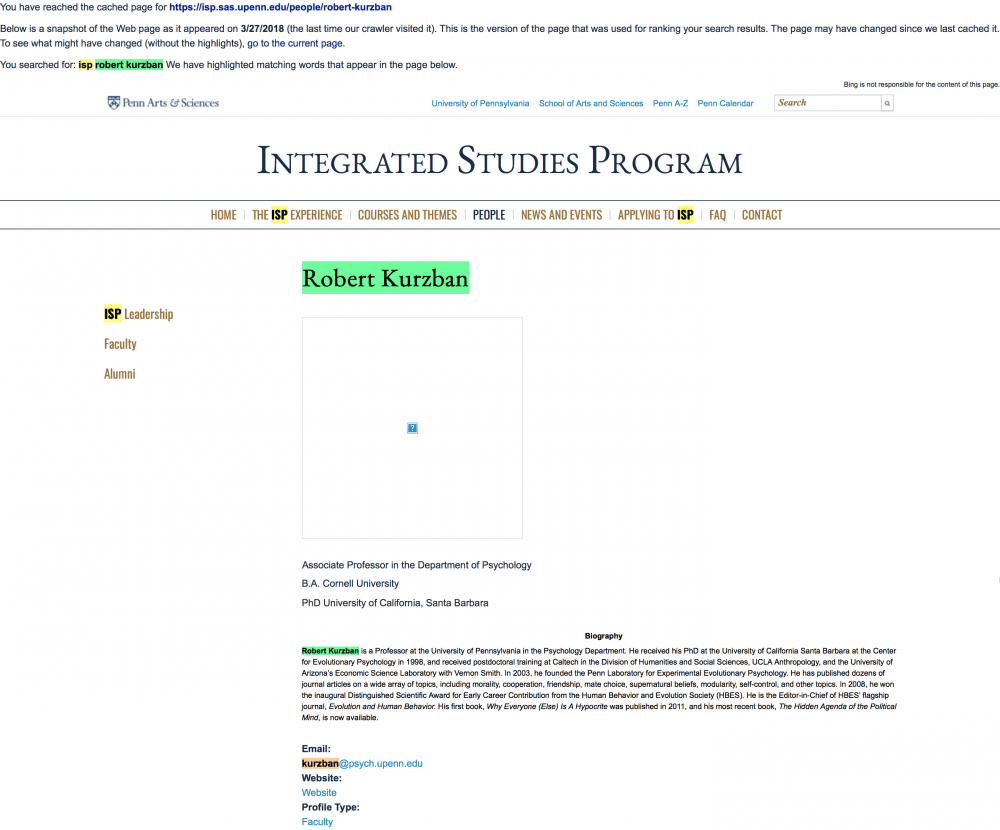The former Undergraduate Chair of the Psychology Department Robert Kurzban had a sexual relationship with an undergraduate female student while he was her instructor, according to three sources close to the student. Kurzban’s alleged behavior directly violates University policy, which has stated since 1995 that sexual relations between teachers and students are prohibited "during the period of the teacher-student relationship."
This policy was recently updated to ban all sexual relations between faculty and undergraduate students regardless of time or context.
“Consensual sexual relations between faculty and student can adversely affect the academic enterprise, distorting judgments, or appearing to do so to others, and providing incentives or disincentives for student-faculty contact that are inappropriate,” states the current policy which is laid out in the Faculty Handbook.
Kurzban’s relationship with the student began in the spring of 2017, according to 10 students who spoke with The Daily Pennsylvanian, nine of whom took the class with the student under Kurzban. At the time, Kurzban, who is a tenured professor, co-taught a mandatory course for freshmen in the Integrated Studies Program with Philosophy professor Karen Detlefsen.

Kurzban met the student on Tinder, according to two individuals whom the student confided in during the period of the relationship. At the time of the relationship, the student in question was a freshman in the ISP course.
She did not respond to multiple emails and text messages asking for comment on this story.
”At first, [Kurzban] didn’t realize my friend was in his class,” said one source, who asked to be identified only as a College sophomore in ISP in order to speak frankly about private conversations. “He realized later, but I don’t think things stopped after that."
Kurzban declined to directly address these allegations, but sent an emailed statement to The Daily Pennsylvanian.
"I take my obligation to academic ethics and integrity very seriously and would never intentionally violate these principles," he wrote. "In terms of University policies, I leave any allegations of violations to the administration to investigate and I am a firm believer in open, honest cooperation in any such investigations."
In a subsequent phone interview, Kurzban declined to elaborate on what he meant by an "unintentional" violation of University policy.
"I don’t have anything to add beyond that statement," he said. “I think the statement speaks for itself.”
The class that Kurzban taught in the spring of 2017 was a two-credit course entitled, “Human Morality and Emotions,” which merged the two disciplines in four-and-a-half hours of lecture and one hour of seminar discussion per week. Kurzban’s section, where he taught evolutionary psychology, included 85 students that semester.
As undergraduate chair for one of Penn’s most popular majors, Kurzban served as one of the chief supervisors for undergraduate instruction in psychology and academic policy for the department. Outside of the Psychology Department, many undergraduates studied under Kurzban through his role as a faculty member in ISP, which enrolls a group of freshmen in a common set of interdisciplinary courses across the humanities and sciences.
Kurzban has also been appointed to a range of other senior positions. On top of leadership roles in the Psychology Department, he regularly mentors undergraduate and graduate students in his lab as the founder and co-director of the Penn Laboratory for Experimental Evolutionary Psychology.
In the current version of this policy in the Faculty Handbook, it states that faculty members who violate the University’s rules on sexual relations between faculty and undergraduates “will be subject to sanctions ranging from written reprimand to tenure revocation and/or termination of employment or expulsion.”
This policy was recently updated, but even in the previous version, Kurzban would have violated the policy by having sexual relations with a student he was simultaneously instructing.
While University administrators have not addressed questions on whether Kurzban will be disciplined for this alleged violation, some ISP students told the DP that they suspect he has been barred from teaching in ISP and stripped of his title as undergraduate chair of the Psychology Department.
According to a cached version of the ISP website, Kurzban was listed as a professor within the program as recently as March 27, but no longer appears on the website.

In addition, as recently as Feb. 24, Kurzban was listed online as the undergraduate director of the Psychology Department. But as of April 1, a cached version of his webpage indicates that this title has been removed. On the undergraduate website for the Psychology Department, the director of undergraduate studies is currently listed as Daniel Swingley. However, on the site for psychology majors as well as a site that lists faculty affiliated with the master of behavioral and decision sciences program, the undergraduate chair was listed as Kurzban as of April 11.

It remains unclear whether Kurzban has been formally demoted, and the University has not provided a clear answer.
Five top administrators and four faculty members, as well as the Vice President for University Communications Steve MacCarthy, did not respond to multiple emails asking whether Kurzban was the current undergraduate chair for the Psychology Department or whether he would continue teaching in ISP. Despite hints otherwise, there is currently no confirmation from the University on what Kurzban's roles on campus are or will be.
Penn’s Faculty Handbook states that “the Provost, Deans [and] Department Chairs” are responsible for responding to reports of faculty violations of this policy and if necessary, implementing disciplinary action.
The Dean of the College of Arts and Sciences Paul Sniegowski and Associate Dean for Graduate Studies Eve Troutt Powell did not respond to multiple emails and calls for comment.
The Dean of the School of Arts and Sciences Steven Fluharty responded to multiple emails by referring back to a statement provided by MacCarthy.
“We take all allegations of sexual misconduct seriously and investigate them,” MacCarthy wrote in a statement on April 9. “However, we do not comment on individual personnel matters."
In response to multiple emails, the Office of the Provost Wendell Pritchett also replied by replicating MacCarthy's statement. The Provost's Office did not address whether they were aware of Kurzban’s apparent violation or whether the University was planning to take action in response to it.
In addition, five other relevant faculty members did not respond to requests for comment. This includes Detlefsen, who co-taught Integrated Studies 002 with Kurzban, Sharon Thompson-Schill, the chair of the Psychology Department, as well as Michelle Pinto, Julio Tuma, and Jean-Paul Cauvin, who were all seminar leaders for Kurzban’s class.
None of the nine administrators or faculty members contacted responded to questions asking whether they were aware of Kurzban’s alleged violation, or whether the University was taking — or had already taken — disciplinary action against him.
Heidi Howkins Lockwood, an associate professor of philosophy at Southern Connecticut State University, said she thinks Penn should take action against Kurzban if it confirms the alleged relationship between him and the student.
"A policy isn’t a real policy if the only consequence is going to be a slap on the hand," she said.
Faculty-student relationships with "the potential for exploitation"
Even though Kurzban’s relationship with the student was consensual, sources close to her felt uncomfortable with the dynamic given Kurzban’s professional relationship with the student.
“It was super inappropriate of him to do that because of his position of power,” said a College sophomore in ISP who is close to the student in question. “In general, it’s against the rules, especially since it’s a student in [his] class.”

A College senior from New York who said the student confided in him about the relationship, agreed.
“Yes, it was voluntary and consensual, but it’s still a conflict of interest because, as a professor, it is his responsibility to ensure that he’s grading evenly and fairly,” he said.
In recent years, many of Penn’s peer institutions have tightened their codes of conduct to prohibit relationships between faculty members and undergraduates, citing the strong potential for an abuse of power within these relationships.
In Yale University’s 2017-2018 Handbook for Directors of Undergraduate Studies in Yale College, the university writes that “the unequal institutional power inherent in this relationship heightens the vulnerability of the student and the potential for coercion.”
Similarly, in Princeton University’s policy, it states that “a sexual or romantic relationship between a faculty member and a person for whom he or she has professional responsibility (i.e., as a teacher, adviser, evaluator, or supervisor) is inherently problematic. With professional responsibility comes power. It is incumbent on faculty members not to abuse, nor to seem to abuse, the power with which they are entrusted.”
Less than two weeks ago, Penn banned all sexual relations between faculty members and undergraduate students, marking the first time since 1995 that this policy has been updated. The new guidelines are a considerable shift from the University's previous policy, which stated that sexual relations between teachers and students were only prohibited "during the period of the teacher-student relationship."
The American Association of University Professors has not recommended an outright ban on sexual relations between faculty and undergraduates, but issued a strong statement to The Washington Post in 2015 on the dangers that these relationships can have for students.
“Sexual relations between students and faculty members with whom they also have an academic or evaluative relationship are fraught with the potential for exploitation,” the AAUP wrote.
Lockwood, the associate professor from Southern Connecticut State University, said she strongly disapproves of sexual relationships between faculty and students, particularly during the period of instruction.
"It flies in the face of all protocol in the corporate world. It is utterly unacceptable," she said in an interview with the DP. "How can you be sure that a grade, letter of recommendation, or exchange for advice isn’t a quid pro quo exchange … for sex or sexual activity?"
Penn officials have also publicly acknowledged the implications that sexual relations between faculty members and students can have. In a March 24 statement to the DP on the University’s decision to ban this type of relationship, Provost Pritchett directly connected the policy change to an ongoing effort to improve Penn’s policies against sexual harassment and assault.
"It is one of our highest priorities at Penn to sustain a campus free of sexual violence, sexual harassment, and all other forms of sexual misconduct," Pritchett wrote. "In this light, we have updated the University’s policy on Consensual Sexual Relations Between Faculty and Students, which was originally published in 1995."
Pritchett did not respond to multiple emails asking whether the University would be addressing Kurzban’s apparent violation of University policy.
A controversial professor in the classroom
A scholar widely renowned in his field, Kurzban is cited in numerous journals in the field of evolutionary psychology. He has taught at Penn since 2002, though his material and teaching style have made him a controversial figure on campus. Multiple students interviewed for this story say they have found Kurzban’s classes on evolutionary psychology offensive.
On his Penn webpage, it states that Kurzban’s research interests include the “nature of evolved cognitive adaptations for social life.” He has published two books, one of which is titled “Why Everyone (Else) Is a Hypocrite: Evolution and the Modular Mind.”
According to four students across two classes he taught in 2017, his lectures on evolutionary psychology included material some students found misogynistic and inappropriate.
College sophomore Jess Araten, who is part of ISP, said that she “was angry every single day [she] was in that class,” but had to finish the course because it was a required class for ISP students that year.
Araten added that she found one of Kurzban’s evolutionary psychology lectures on the fundamental theories behind mating principles particularly offensive.
“He was saying women are not supposed to have a lot of sexual partners, heteronormative relations are the norm, and everything is about procreation,” she said. “He also asserted that men don’t have committed sexual relationships and women have single partners. This is all literally on his slides.”
Another College sophomore in ISP added that much of the material seemed like it was “him trying to support his own sexist and misogynistic views using data that didn’t even seem legitimate.”
“He was trying to explain that for evolutionary reasons, the most beautiful people that people are most sexually attracted are 18- and 19-year-old women,” she said. “He then showed pictures of women’s bodies.”
“The moment he said that in lecture it was like, ‘Oh my God, it’s more like he finds that kind of content attractive and he’s just generalizing it to all of science,’” she added.
But not all of Kurzban’s students agreed. Some described him as an intelligent and charismatic professor “with an offbeat sense of humor.”
Michelle Lu, a College sophomore who was in the same class, described Kurzban in an email as a “good lecturer” and an “engaging” professor.
Thea Farah, a 2017 College graduate who majored in psychology, said she appreciated his approachable sense of humor in her honors psychology seminar.
“I’m sure at some point, someone’s going to be rubbed the wrong way by his humor, but I actually really liked it, as did a lot of other students,” she said.
2017 College graduate Emily Fisher, who also majored in psychology, said that Kurzban was one of her favorite professors during her time at Penn, as he was very approachable.
"There was one time he was wearing this really, really vibrant Hawaiian shirt [in a picture he showed students from a trip he took to the Galapagos], and I feel like that kind of captures his whole vibe too," Fisher said. "It was almost kind of this nerdy, psych research vacation … and he showed his students the pictures to make it more personal, which I thought was cool. ”
Other students, like the College senior from New York, found that Kurzban’s attitude and sense of humor negatively affected their emotional well-being.
“I stopped going to class at one point because I felt like it was harming my experience at Penn. I just didn’t want to put myself through it anymore,” he added.
Araten echoed these sentiments, noting that she stopped regularly going to class because of how offensive she found the material.
Executive Editor Rebecca Tan and Senior Reporter Dan Spinelli contributed reporting to this story.
Correction: A previous version of this article incorrectly stated that Professor Robert Kurzban was faculty director of the Integrated Studies Program. He was in fact just a faculty member of ISP. The DP regrets the error.
Have a tip? Send all news tips to newstip@thedp.com. For confidential tips, encrypt your message with our PGP key (fingerprint 8D74 A5C2 9AE2 E1A9 74CD C413 E076 396A CBAB 8925). Physical mail can be sent to Executive Editor Rebecca Tan at The Daily Pennsylvanian: 4015 Walnut St., Philadelphia, PA, 19104.
The Daily Pennsylvanian is an independent, student-run newspaper. Please consider making a donation to support the coverage that shapes the University. Your generosity ensures a future of strong journalism at Penn.
Donate




Most Read
More Like This